Chester County Leadership: Karen Simmons, President/CEO, Chester County Community Foundation
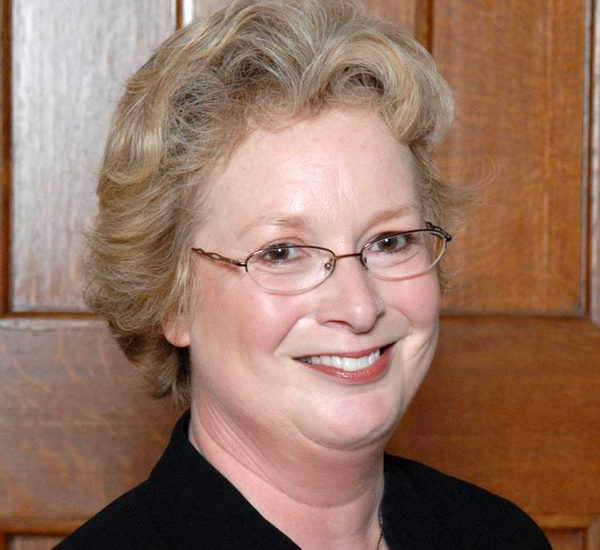
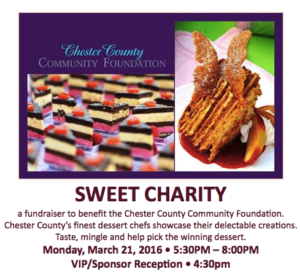 As Karen Simmons, President/CEO of Chester County Community Foundation, gets ready to host Sweet Charity, her Foundation’s signature annual event which attracts 500 philanthropic dessert lovers Monday evening, she speaks with VISTA Today about growing up in Western New York where she was both her high school’s Valedictorian and her town’s Onion queen as well as her long career path through Skidmore College, Temple and LaSalle Universities to assume the leadership of Chester County Community Foundation on September 11, 2001.
As Karen Simmons, President/CEO of Chester County Community Foundation, gets ready to host Sweet Charity, her Foundation’s signature annual event which attracts 500 philanthropic dessert lovers Monday evening, she speaks with VISTA Today about growing up in Western New York where she was both her high school’s Valedictorian and her town’s Onion queen as well as her long career path through Skidmore College, Temple and LaSalle Universities to assume the leadership of Chester County Community Foundation on September 11, 2001.
Where were you born, Karen?
My mom and dad were high school sweethearts who grew up in Rochester, New York, so that’s where they started their family. I’m the second of five children. At the time, my dad worked for the Rochester Telephone Company along with a steady stream of second and third jobs to support a quickly growing family.
What do you remember about growing up in Rochester?
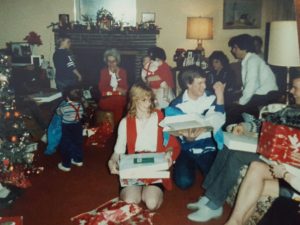
At first, we lived close to my mother’s and father’s extended families, so we had dozens of cousins nearby, with lots of family gatherings. We visited Grandma and Grandpa almost every Sunday for supper. I remember gathering in front of the television every Sunday night with my cousins to watch the Wonderful World of Disney.
Downtown Rochester was the site of some disturbing race riots in the 1960s; so dangerous that Governor Nelson Rockefeller called in the NY National Guard. My parents decided it was time to get some fresh air. My father has always preferred open space, so we pulled a “Green Acres move” and relocated to the country.
Where did your family go?
We bought an old farm in Elba, New York, a small village with less than 1,000 residents, midway between Rochester and Buffalo. Elba has incredibly rich farmland–muckland, actually—great for growing onions and potatoes. I chuckle when I go to my local Chester County Wegman’s and Walmart these days, and pick up a bag of onions. Take a look at the label—they’re likely to be from Elba, NY.
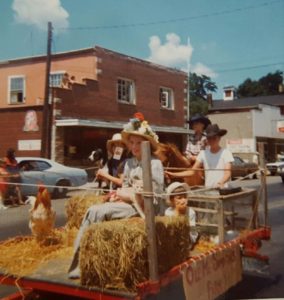
Both my parents have an incredible work ethic. We were always doing something productive as kids: tending the huge vegetable garden, picking up fieldstone to build the chimney and fireplace, cleaning the church and rectory, cutting and dragging pine trees to sell at Christmas, canning and freezing vegetables. There were all sorts of community gatherings. Small town life is all about helping each other through the hard times and celebrating the good times.
What lessons did you take from that experience that stay with you today?
My parent’s clear message is to be industrious, dedicated and passionate about whatever you choose to do. My parents taught us to roll up our sleeves, give it our best try, and get ‘er done.
Where did you go to high school?
When we moved from the city, I attended the K-12 school in the village of Elba.
Did you have a job in high school?
Of course. We worked our farm, and helped our neighbors. I helped raise my younger siblings and did a lot of cooking, canning, and laundry. We took care of all our farm animals and pets. We sold Christmas trees. We sold antiques from our barn. All those jobs help support our family.
I also took a hobby, and turned it into a career. I inherited a love of music from my mother and grandmother. Mine took the form of classical music and ballet dance. One of my first ballet teachers was a wonderfully creative choreographer, but an impatient teacher and disorganized businesswoman. Over time, as a teenager, I started teaching ballet classes for her, and managed the finances of our three ballet studios.
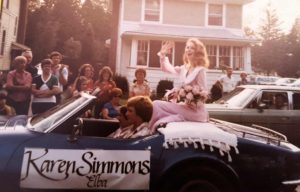
How old were you when at this point?
I was 14 or 15 when I started to teach and manage the finances. At the time, I didn’t see it as unusual. It was just something I did.
How did you know you could step in and teach and run a business?
I don’t really know. Instinct. I was a good, helpful student in school. Teachers were always asking me to coach other students. Teaching and organizing came naturally to me.
Looking back, do you have good memories of high school?
Yes. I accomplished a lot. I was stage manager for my high school plays, editor of the yearbook, class officer, won lots of awards and scholarships, and was class Valedictorian. Plus to top it off, the summer I graduated high school, I was named Elba’s Onion Queen. We had quite a celebration at the Onion Festival that year.
What kind of music were you listening too at the time?
I was listening to classical music: Beethoven, Tchaikovsky, Delibes, Prokofiev. Then Stravinsky, Copeland, Bernstein. The Eastman School in Rochester has an incredible orchestra.
You’re finish high school and go off to college. Where did you go?
I went to Skidmore College in Saratoga Springs, NY.
Did you look at other places?
No. My high school art teacher was a Skidmore alumna. She wrote me a wonderful reference letter. Skidmore offered me a generous scholarship and early admission. So I went to Skidmore.
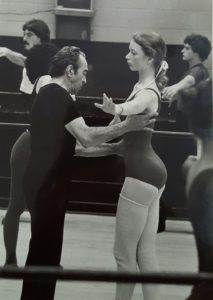
Did Skidmore end up being a good fit for you?
Definitely. Skidmore is located in Saratoga Springs, which has big-city amenities in a small town. Skidmore combined my love of arts, ballet, business, and education, I love Saratoga’s Victorian architecture, majestic gardens, and stunning thoroughbred racehorses. At Skidmore, I triple-majored in Business, Education, and Dance, while working in the Business Department and interning.
Where did you intern?
Skidmore internships were crucial to my career development. My first internship was at the State University of New York Program of the Arts in Albany. I organized music, theatre and dance tours for the 67 SUNY system colleges and universities.
My second internship was with the Juilliard School and New York City Ballet at the Lincoln Center. I lived in a penthouse on Park Avenue in NYC and walked the halls of Juilliard with George Balanchine and Lincoln Kirstein, two of the foremost names in ballet. I helped with a fundraising gala at Lincoln Center that raised $1.4 million in one night.
My third internship was in the public relations department of the Saratoga Performing Arts Center. It turned into a summer job, where I helped with public relations for the New York City Ballet and Philadelphia Orchestra’s summer season at SPAC, plus 40+ rock & roll concerts. I got to buy Eric Clapton a jacket when he left his at the airport, help with a search party when Jerry Garcia of the Grateful Dead went missing before a concert, and count out M&Ms for Jackson Brown.
What did you do after graduation?
I came to Philly for grad school at Temple University. I went from refined Saratoga Springs to gritty North Philly. It was fabulous.
How did you end up at the Chester County Community Foundation?
The Chester County Community Foundation started in 1994, founded by Dr. Henry Jordan, Betty Moran, Carol Ware, and Skip Huston. In 2001, the first Executive Director Mike Rawl transitioned out, and Henry Jordan turned over the Chair to John A. Featherman III, Esq.
I was heading the Nonprofit Development Center at LaSalle University in North Philly by this time, and wasn’t looking for a new position. Seven people called me and suggested I take a look at the position at the Community Foundation. I declined six times, but finally paid attention and decided to take a look when the seventh person mentioned it.
Why were these seven people targeting you?
One reason was that I had been living in Kennett Square and driving an hour on Route 1 every day to get to the office. They thought I would enjoy a position twenty minutes from home. They also realized that my strategic planning, organizational development, board development, and fundraising experience could be a good fit for the Community Foundation.
What was that transition from LaSalle to Chester County Community Foundation like?
My first day of paid employment at the Community Foundation was September 11, 2001. We were in an 8:00 a.m. committee meeting with the founding and current Board chairs, when a staff member knocked on the door to tell us that something terrible had happened. All of us knew people in NYC so we jumped up to try to reach them by phone.
So, initially when I came to the Community Foundation, the economy was shaky, and people didn’t know who in the world to trust. We reacted by recruiting a diverse array of volunteers to our committees, to expand our thinking, our knowledge, our resources, and our reach. Diversity is the key to our success.
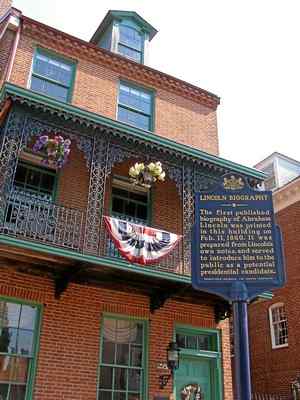
Does giving to Chester County Community Foundation fluctuate depending upon the waves in the economy?
The Chester County Community Foundation focuses on planned giving. We work with estate planning attorneys, accountants, wealth managers, and bankers whose clients want to do something charitable and long-lasting. People always do estate planning, no matter what the economy is doing.
What challenges and opportunities does the Community Foundation have going forward?
Because we have so many “communitarians” in Chester County, we have an incredible opportunity. People love where they live, and they are very proud of their community. They want to give something now, while they can see the impact. Plus they want to make provisions for later, so their legacy will be remembered.
We find ways for people to make a charitable difference that has long-term integrity, and that address the real core issues. Whatever people are passionate about–health, human service, arts, culture, education, the environment, and religion–we helping them understand what’s going on, and how to make smart grants now and forever.
There are individual funds you establish, correct?
Yes, these are separate family foundations and nonprofit endowments with separate accounts. We aggregate their money for investment purposes to take advantage of good rates available to us at high dollar volume.
What challenges are there?
People are so busy and have so many things going on, sometimes they simply don’t know where or how to jump in. We encourage people to get involved as volunteers, committee members, and board members of nonprofit charities, so they get to know the organization, its needs, its challenges and its strengths. Nonprofits need volunteer time, money, and expertise. We help connect people who care with causes that matter, now and forever.
How do people find the Community Foundation?
A lot of time it’s word of mouth by people who have charitable funds with us. Plus people learn about us through their attorney, accountant, or wealth manager. Or sometimes it’s just because they are interested in Lincoln, and they happen to stop by the Lincoln Building for a history tour, and find out that it’s our headquarters.
What is the best piece of advice you ever received Karen?
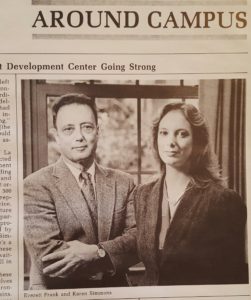
I have fond memories of my mentor Everett Frank, who passed away over a decade ago. He founded LaSalle’s Nonprofit Center after a long and successful business career. Everett was careful to balance family, volunteerism, and business. He was a great lover of humanity, and helped thousands of people to find their way, personally and professionally.
Everett was a consummate strategic planner. From Everett, I learned that strategic planning is not just a business tool. On a personal level, strategic planning is a useful construct to help people visualize their dreams, establish their core values that guide their way, discern who and what will help and hinder them along the way, and take steps to pursue what will make each person feel productive, happy and fulfilled. Now, and forever.
Connect With Your Community
Subscribe to stay informed!
"*" indicates required fields




























![95000-1023_ACJ_BannerAd[1]](https://vista.today/wp-content/uploads/2023/03/95000-1023_ACJ_BannerAd1.jpg)























